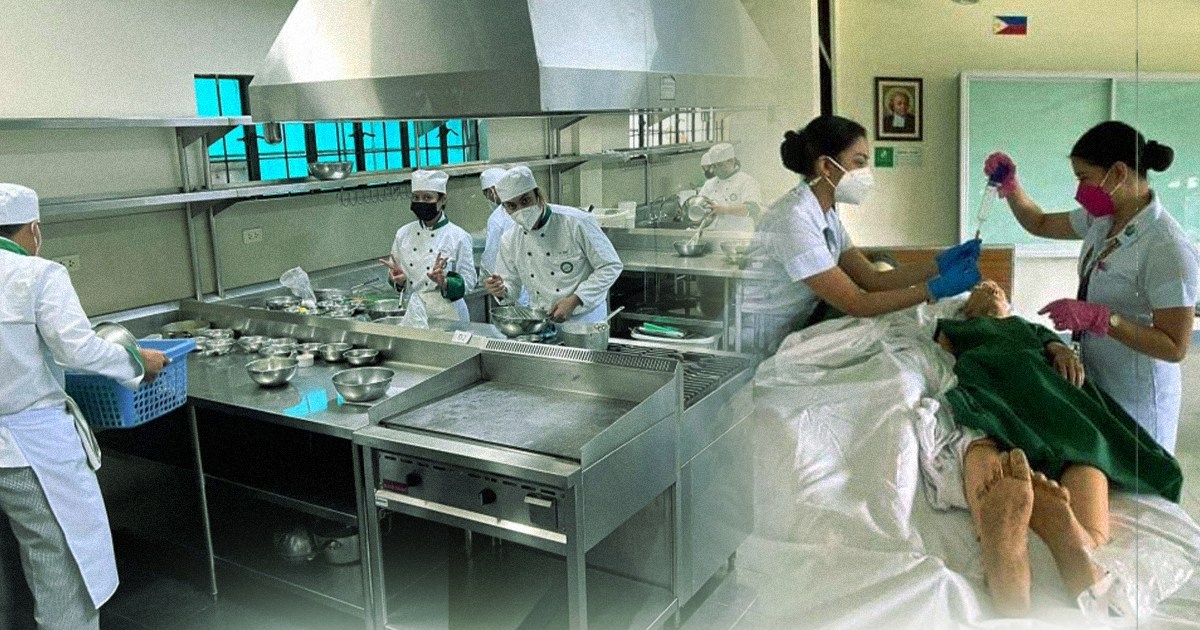
Two years since the start of the COVID-19 pandemic, De La Salle Lipa (DLSL) welcomed its nursing and culinary students back inside their classrooms and kitchen laboratories, March 1.
This marks the first time that DLSL students from any level were able to hold classes within the campus premises since March of 2020. Only nursing and culinary students have been allowed to resume classes for now due to the required hands-on training in their respective fields.
Students and educators from both departments expressed how pleased they were to finally conduct classes in person, despite in-campus classes to be held only on a staggered schedule to minimize contact.
Nursing professor Ronnie Amazona said that returning to classrooms was a nostalgic experience that would also remove the limitations the virtual setup posed during the delivery of their lessons.
“As nursing faculty and educators, it would be more fulfilling to us that lessons and skills will be provided to students first hand,” Amazona said.
Meanwhile, a chief instructor in the culinary department, Pamela de Leon, also said that having the students inside an environment that simulates their work will help them become more knowledgeable and skillful in their fields instead of the virtual setup.
“Since our course is very technical in nature, the actual [hands-on] of cooking, tasting, and having almost similar industry working experience inside our fully equipped kitchen is very vital for our soon-to-be graduates,” de Leon said.
For Angela Gail Recto, a third-year nursing student, being back on campus after the two-year hiatus was a surreal experience, but she was also glad because of how the face-to-face setup would help keep her focused on her studies.
“I like being surrounded by my classmates because it helps me keep myself on track. Unlike during online classes, I get distracted a lot at home,” Recto said.
The nursing department follows a “4-10” cyclical student shifting model, wherein they will have four days of classes on campus followed by 10 days of online classes.
(Related story: http://lavoxa.org/2021/12/06/con-to-implement-limited-face-to-face-classes-next-sem)
Meanwhile, culinary students will have their synchronous online engagement during the first week, followed by three weeks inside the kitchen every Tuesday and Thursday, and the fifth week to be continued online.

To maintain the safety of everyone attending the classes, both nursing and culinary students follow several health protocols mandated by the Commission on Higher Education (CHED) and the Inter-Agency Task Force for the Management of Emerging Infectious Diseases (IATF).
College of Nursing (CON) Governor Maria Seth Burias said that upon entering the campus, students must sanitize their hands, have their temperatures checked, enter the misting booth, and fill out health declaration forms.
There are also designated walkways and directions that students and instructors need to follow as they make their way around the campus. This includes having those with vehicles exit only through the side gate, while those on foot may only be allowed to exit through the CBEAM gate.
Burias also shared that another set of rules for the nursing students is being followed inside classrooms during lessons.

“Each classroom’s capacity is up to 12 persons only with the chairs having a 2-meter distance apart from each other. Students are [also] advised to minimize conversations and close contact with each other during classes or classroom stays,” said Burias
Meanwhile, Karl Adrian Tolentino, the College of International Hospitality and Tourism Management (CIHTM) governor, shared that only nine students are allowed per kitchen laboratory.
To help students cope with these changes, both Burias and Tolentino said that their respective Student Government (SG) councils communicate with the faculty and staff, so students are given the assistance to address their concerns while attending their limited face-to-face classes.
“[CIHTM-SG] also assure that students are aware of the new normal standard operating procedure both within and outside the kitchen, as well as on campus,” Tolentino said.

Burias also added that SG-CON has communicated with the Institutional Safety, Security, and Emergency Services Office (ISSESO) to ensure that nursing students follow the protocols. At the same time, the Institutional Health Services Office will monitor the students’ status and well-being as they stay inside the campus.